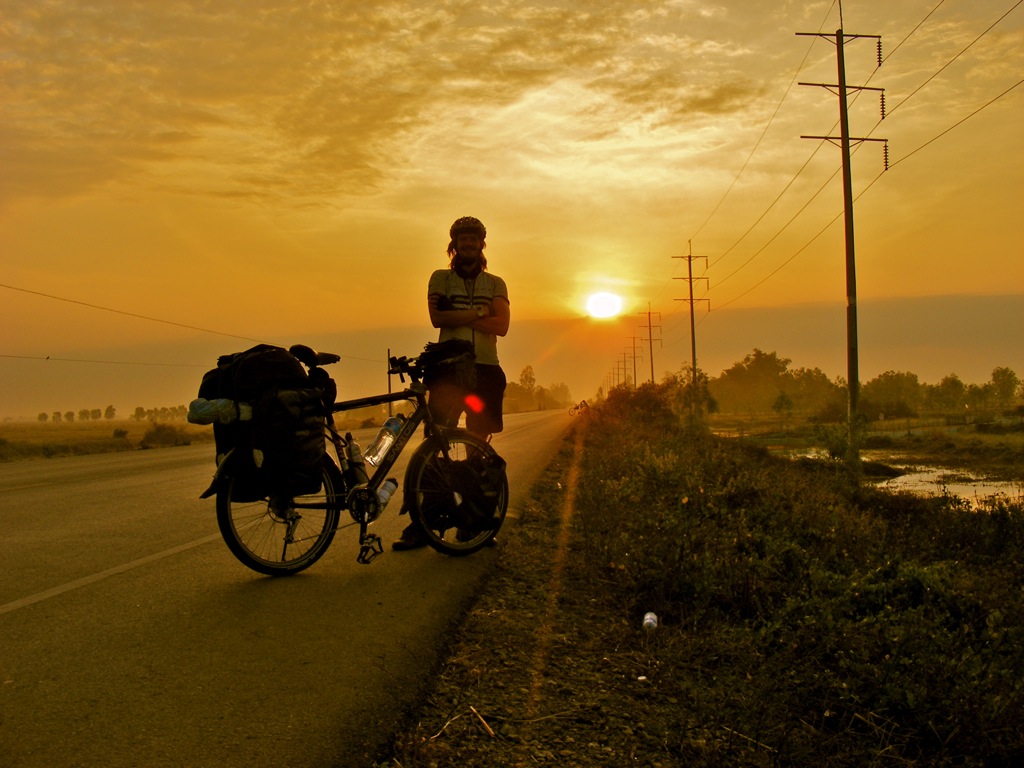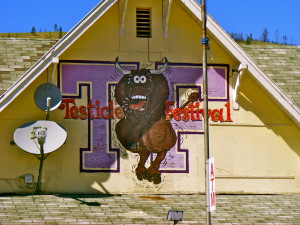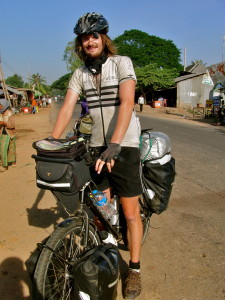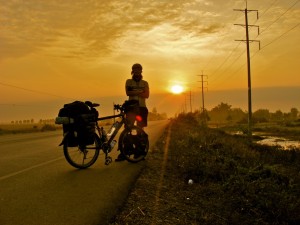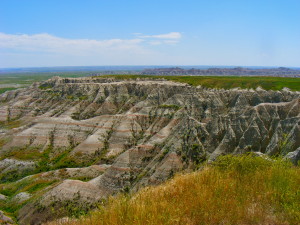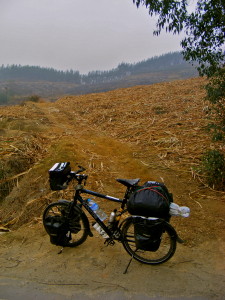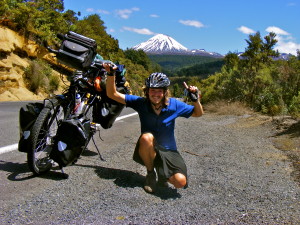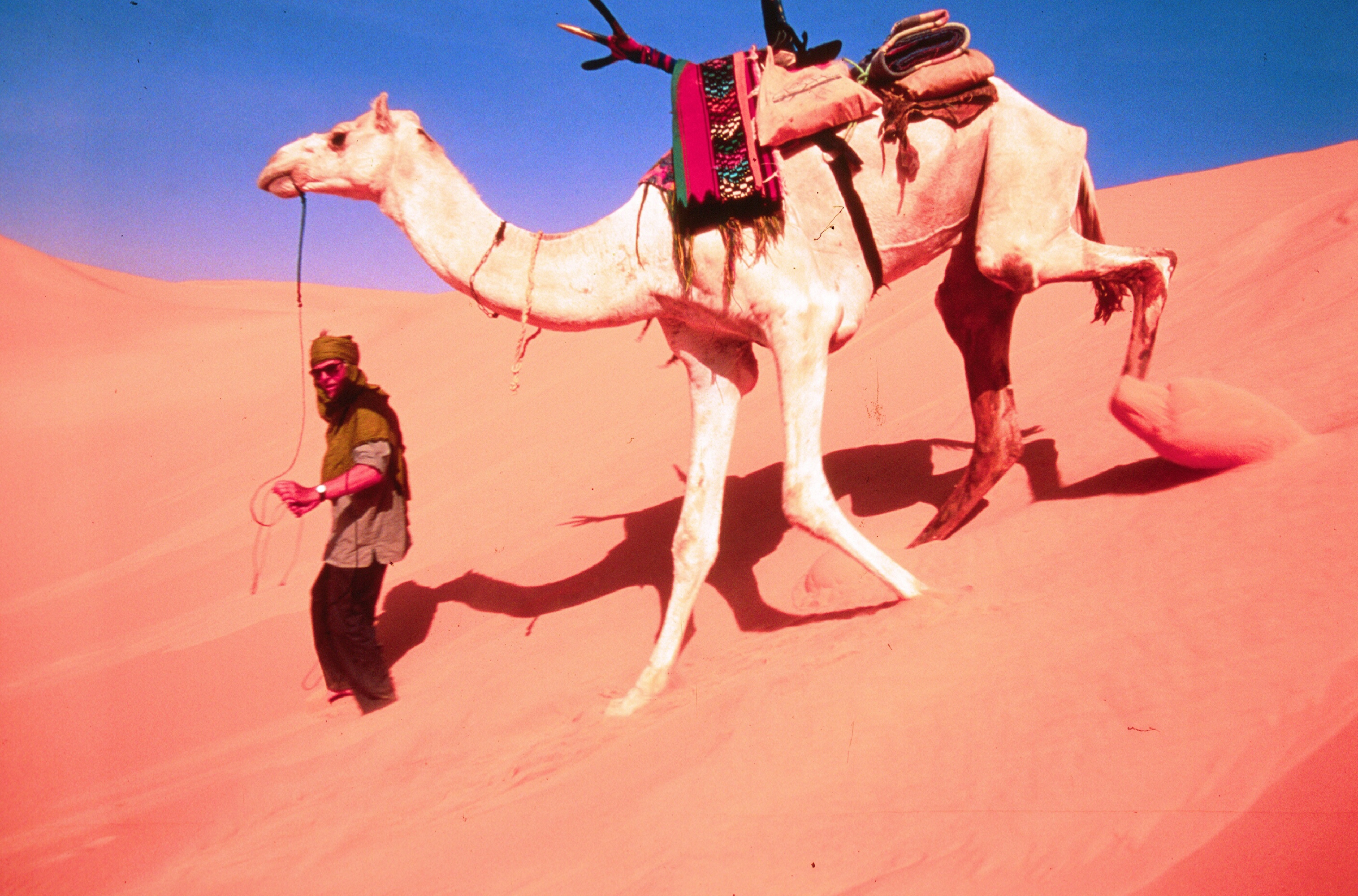EXCERPT FROM THE BOOK:
PROLOGUE
It seemed a terrible shame to meet my end in Iowa; I couldn’t imagine anywhere more disappointing to die. If I were a betting man I’d have reckoned on the most dangerous thing in this state being sheer boredom. Corn, beans, corn, beans… a cow… corn, beans… the scenery hadn’t changed for weeks and I was slowly dissolving into stimulation-deprived madness. The only other feature even remotely worthy of note was the headwinds, but even these were more nuisance than hazard. My current predicament, then – attempting to escape through cornfields from a gun-toting alcohol-soaked rancher – was not something I expected.
I squeezed the bike through a small gap left by the partially closed garage door and jumped on. Standing on the pedals my feet automatically began to pump rhythmically; by now an action as natural as breathing. Dirt and gravel groaned underneath the tyres and my luggage bumped along behind in counterpoint. I wasn’t even midway on this journey across the USA by bicycle, and it seemed terribly unfair that such a (seemingly) harmless invitation to stay with a rancher could have gone so wrong. But wrong it had gone, drastically so – a steady decline in civility had reached its lowest ebb when alcohol and madness were poorly mixed and I had been ledto an outhouse full of guns. One was pointed at my head. Seconds after that I’d panicked and pushed the owner of the gun into a shed, closing the heavy lock as he tumbled inside.
I was riding away now as hard as I could, the trailer that trundled along after the bike serving as a constant reminder of just how slow and vulnerable I was. Light had long since faded from the day but the moon picked out features here and there, hinting at a bigger world beyond my narrow vision. To my left and right flat cornfields extended for miles, broken only occasionally by a small clump of trees assembled around each homestead.
Looking over my shoulder, there appeared in the distance behind the inevitable headlights of a large truck, beams bouncing wildly. It was still a way away, but I knew already the details – a grey Dodge Viper; inside a bald man with a goatee driving, peering into the darkness through eyes infused with a crate of Bud Light. He would be carrying at least one firearm, and until recently he had been lying on the floor of the shed into which I pushed him.
Ahead was the only possible route to freedom yet ironically, ridiculously, this direction promised something perhaps even more dangerous than a drunken rancher with a rifle disorder. Up ahead, stretching from dirt floor to brooding sky was a violently rotating tornado, the best part of half a mile wide. A deathly silence surrounded it. Like the crashing of a huge wave or the collapsing of a skyscraper, the movement seemed to happen in slow motion and I could only tell its true vigour by the way it decimated the landscape. The whole scene was ludicrous, like a Hollywood B-movie.
I thought briefly of how one day I might tell people about this and few would believe me. A group of trees swayed, snapped
and were swallowed like twigs. Next a small lean-to for livestock crumbled, and this too was sucked up in a heap of corrugated iron and bricks. I was sure I saw sheep bleating their way into the abyss. A similar fate (with only slightly less bleating) was promised to me if I kept going, now just a mile away.
This was not what I had expected when I set out to cycle across America. In fact, I had actively hoped to avoid anything even remotely similar to this. I was a kid, barely twenty-three years old, off in search of adventure. Well, here it was, served American style – big, brash, balls-out. As well as being afraid, a large part of me was annoyed – my journey to this point had been full of the most wonderful people I could have hoped to meet, all going out of their way to be kind and hospitable. It seemed unfair that one boozed-up idiot could ruin that.
Despite it all, even despite the intense fear, there was an odd, hard-to-pin-down buzz about the scenario.
In a strange sense, I was feeling more alive than ever.
WANDERLUST (MY REASONS FOR GOING) – CHAPTER 4
At university, I had learned that academia was not for me. During stints in employment, I found that offices only succeeded in making my feet so itchy that it’s incredible I didn’t scratch them off completely.
It was the idea of a job, however – a real one with a decent wage and important, responsible duties – that I felt obligated to move towards. From a young age I had been told that I should study hard, be sensible, and eventually get the fabled ‘good job’. Everyone seemed to understand that phrase, ‘a good job’, to be shorthand for a comfortable and happy life. A sensible life. And that was that.
A month after I graduated from university with a degree in Film Studies, I was offered my first ‘real’ job – to become, on a temporary basis, a Cinema Manager. My role was ensuring that screenings went smoothly and all the other employees turned up for work. It was a fine job, I suppose, but not what I’d hoped for. There was nothing about it that got me excited, nothing that made me feel alive.
There was so very little to do, yet I was obliged to be present for a large part of each day. Ninety-five per cent of that timewas spent in my office with the door closed, poring over maps of the world in a clandestine manner. Maps facilitate dreams better than anything else; I can tangibly feel the separation from reality, the point at which the suppressed adventurer within us bursts forth and cascades wildly across continents. Maps were my escape from the humdrum mundanity of what was becoming my life. Internally I held a violent desire to one day explore the world for real.
I told myself to stop complaining about a lack of fulfilment, and instead to be thankful I had work at all. Many of my peers from university, through no fault of their own, had not only struggled to enter their chosen field but had roundly failed to acquire any sort of job at all. So poor was the market that when a position opened up in the local supermarket, 650 people applied to become a ‘Till Operator’. Of those despairing souls, 460 had undergraduate degrees, 135 held Masters, and fourteen were in possession of a doctorate. For all of us, to graduate in the summer of 2008 was to be released kicking, screaming and thoroughly unprepared into a global recession.
Once, on an evening jog along the rain-spattered cobblestones of Canterbury’s side streets, I dodged in and out of shelter beneath awnings, watching the bowed evening light pierce through sky behind the cathedral. This was a beautiful city, I thought, but there were very few jobs here. There were equally few jobs in all the other beautiful cities, too. With a degree in Film Studies I was bottom of the heap. I was left with two options. I could keep hunting for a job – lower my expectations and content myself with working at something that didn’t proffer anything useful in any sense but which would keep me adequately fed, sheltered and entertained –or I could cut and run, and see this situation as opportunity rather than obstacle.
I felt woefully incompetent to be considering real-world activities. The idea of settling down for (potentially) the rest of my life into a career just because it was the only thing available in an economic downturn seemed disastrous for everyone involved. Challenges, Experiences, Happiness. This is what I sought, I decided. I was young and naïve and enthusiastic. A friend told me that he thought, above all, I ached for a lifestyle that would require me to actively participate in my own existence – to strive, to seek, to find, and not to yield. Someone else called it wanderlust.
*A review of the book will follow
